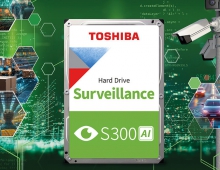
Toshiba to Start Mass Production 19nm NAND Flash Memory
Toshiba will start applying its second generation 19
nanometer process technology to mass production of
2-bit-per-cell 64 gigabit NAND memory chips later this
month.
Toshiba has used the new generation technology to develop
small 2-bit -per-cell 64 gigabit NAND memory chips,
with an area of only 94 square millimeters. Using a high
speed writing method, the next generation chips can achieve
a write speed of up to 25 megabytes a second.
Toshiba is also developing 3-bit-per-cell chips by using this process technology and aims to start mass production in the second quarter of this fiscal year. The company will initially introduce 3-bit, multi-level-cell products for smartphones and tablets by developing a controller compatible with eMMC, and will subsequently extend application to notebook PCs by developing a controller compliant with solid state drives (SSD).

NAND flash memory is used in memory cards, smartphones, tablets and notebook PCs, and is increasingly deployed in enterprise products, including SSD for data centers.
Toshiba is competing with Samsung in the NAND flash memory market, although Samsung seems to be already a step ahead. The South Korean company said last month that it began mass-producing a 128Gbit NAND chip with 3-bit-per-cell technology, also using a process smaller than 20 nanometers.
Toshiba had 31 percent of the world NAND flash market last year in terms of revenue, lagging Samsung's 37 percent, according to data from IHS iSuppli. Micron Technology followed with 14 percent.
SanDisk, which is cooperating with Toshiba in the production of flash memory storage solutions, has also begun sampling its flash memory products based on its second generation 19 nanometer manufacturing technology.
Toshiba is also developing 3-bit-per-cell chips by using this process technology and aims to start mass production in the second quarter of this fiscal year. The company will initially introduce 3-bit, multi-level-cell products for smartphones and tablets by developing a controller compatible with eMMC, and will subsequently extend application to notebook PCs by developing a controller compliant with solid state drives (SSD).

NAND flash memory is used in memory cards, smartphones, tablets and notebook PCs, and is increasingly deployed in enterprise products, including SSD for data centers.
Toshiba is competing with Samsung in the NAND flash memory market, although Samsung seems to be already a step ahead. The South Korean company said last month that it began mass-producing a 128Gbit NAND chip with 3-bit-per-cell technology, also using a process smaller than 20 nanometers.
Toshiba had 31 percent of the world NAND flash market last year in terms of revenue, lagging Samsung's 37 percent, according to data from IHS iSuppli. Micron Technology followed with 14 percent.
SanDisk, which is cooperating with Toshiba in the production of flash memory storage solutions, has also begun sampling its flash memory products based on its second generation 19 nanometer manufacturing technology.





















